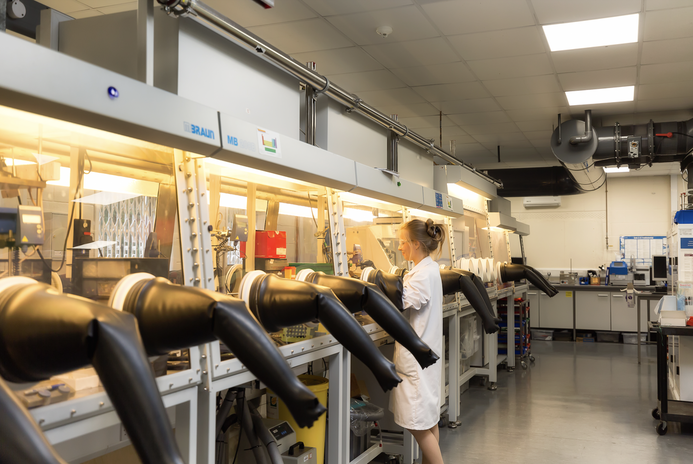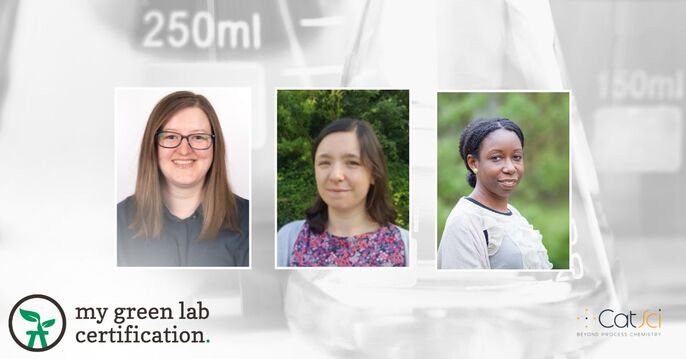
To honor their commitment to sustainability, My Green Lab is proud to award CatSci with a Platinum Green Lab Certification for their Chemistry Lab as well as a Silver Green Lab Certification for their Cardiff-based Analytical Lab. By implementing sustainability best practices learned through the program, the CatSci team is able to stand by their goal of developing sustainable manufacturing processes for their customers and demonstrate their commitment to reducing their labs’ environmental impact.
The My Green Lab Certification program engages laboratory personnel in a powerful, proven process that educates on 14 laboratory sustainability topics such as energy, water, waste, chemistry/materials, and engagement. This program, supported by a global community of Green Lab Leaders, was recently recognized by the United Nations Race to Zero campaign as a key measure of progress towards a zero-carbon future, and is considered the gold standard for lab sustainability.
With sustainability at the forefront of their minds, the team at CatSci, initially introduced by Dr. Alan Steven and led by Dr. Charlotte Dalton, engaged in Green Lab Certification in order to reduce the impact of their laboratories.
“Developing environmentally sustainable manufacturing processes is part of our mission statement and a key deliverable for many of our customers,” says Dalton. “To align with this goal, we wanted to look at how we could improve our day-to-day research activities in the laboratory with a view to becoming more sustainable.”
At the onset of CatSci’s My Green Lab Certification journey, a Sustainability Team was formed and met monthly to discuss and put into action ways to improve their sustainability. After their initial assessment, they went to work helping colleagues understand the environmental impact of their labs and sharing ways to begin reducing their footprint.
Since taking part in the My Green Lab Certification, the team at CatSci has further prioritized sustainability through a number of measurable changes that have helped their labs not only save energy and resources, but also create a culture of sustainability.
“Taking part in the certification process has had a big impact on the sustainability culture here at CatSci,” says Dalton. “Before completing the certification, a lot of our staff were interested in sustainability, but many were not sure how we could apply this in the workplace or if it was even possible. By taking the My Green Lab Certification, we have demonstrated that sustainability is a goal we can work towards in the laboratory. Undertaking the certification process has really kick-started our sustainability culture here at CatSci and we hope to keep it up!”
Along with Dr. Dalton, we spoke with Dr. Alice Dunbabin and Dr. Nadia Fleary-Roberts – both of whom provided more insight into CatSci’s journey through Green Lab Certification.

Starting the Process
In your opinion, why must laboratories be more sustainable?
Dr. Dunbabin: In recent years, many campaigns have encouraged people to change their habits at home such as recycling schemes and reducing plastic waste, however sometimes it can feel like an impossible task to extend this to our laboratories due to the abundance of single-use plastics and toxic materials. If we can reduce the impact of our labs through reducing waste and energy usage on site, this benefits the business and the environment. Going further than that, if we can use our skills as scientists to implement greener processes across the chemical sector this will have a huge impact.
What were some of your specific expectations from the program when you first started? How did those expectations change or develop as you went along?
Dr. Dalton: When we embarked on the program, we were initially not sure what to expect. Once the great team at My Green Lab explained the process to us, things became a lot clearer as to how the process would actually work. Based on our initial interactions, we were confident of great support from the My Green Lab team.
What challenges concerning lab sustainability and engagement were you experiencing before starting the GLC Program?
Dr. Dalton: The main challenge we were experiencing before starting the program about lab sustainability is that we did not know where to start! We needed a framework to help us understand what points to consider and focus on, and to help set goals to work towards. The My Green Lab Certification program has done just that, and now that we have started, we aim to keep the ball rolling and continue to improve our sustainability, especially as we grow into new laboratories.
A Glimpse into the Sustainability Journey
What were some practical things you did to better integrate sustainability in your lab operations?
Dr. Fleary-Roberts: We had signage put up displaying “could” and “could not” be recycled and shared this with the team in a meeting, we also discussed the best way to minimize the use of single use plastics and suggesting alternatives when safely possible. We also formalized our shut-down procedures to incorporate switching of lights and any equipment that was not in use.
Dr. Dalton: Many of the main things we did to improve our My Green Lab Certification score after the baseline assessment were based around helping our team understand the impact of our labs on the environment. Some of this was information sharing, for instance we found that all our labs and offices had LED lighting but that many people in the team did not know this.
In addition, we reviewed the amount of single-use plastics that we were using for lab work and communicated to the team how they could reduce the amount of single-use plastics they use e.g., by considering re-usable items.
What was the most memorable moment of this journey for you?
Dr. Dunbabin: My favorite moment was when we had gone through the results of the first survey and we knew we had many areas to improve, but we had a plan of action and a great team of people working together.
Dr. Dalton: The most memorable day of the whole journey was the day we got the certification results. We were thrilled with a Platinum award for the Chemistry lab and Silver for our Cardiff-based Analytical lab. The Sustainability Team got so many emails saying well done on the result and there was a buzz around our Cardiff site for the whole day after we got the results!
Creating a Culture Shift
What effect did the certification process have on the sustainability culture within your organization?
Dr. Fleary-Roberts: We now know what areas need to be focused on and what improvements may be needed in the future. Our team also has a better idea of where we stand and are keen to help introduce new sustainability measures.
What were the most important aspects of your sustainability efforts that affected your score?
Dr. Dalton: The most important aspects of our efforts which affected our score was to help our scientists understand more about how they could use the equipment and processes we have to help make the lab more sustainable. For instance, we found out more about the lighting, ventilation, and energy use in the labs. Our best scores for the labs were in the Fume Hoods, Plug Load, and Large Equipment categories – we have really made an effort to help scientists identify how they can best use the equipment to minimize energy usage and improve sustainability.
What positive lessons have you learned through the certification process that would drive future decisions regarding waste/energy/procurement/water, etc.?
Dr. Dunbabin: By working together across different functions, we can drive changes in all areas of labs. Having perspectives from different areas such as chemistry, facilities, and operations has really helped us to think of new ways to reduce our environmental impact, from the consumables we purchase to equipment usage.
What advice would you give to similar laboratories/organizations who are pursuing or intend to pursue GLC?
Dr. Dalton: The advice that we would give to other laboratories/organizations like ourselves who are interested in the My Green Lab Certification would be to go for it! Many people are increasingly passionate about sustainability and in a workplace with a positive culture, that passion can be harnessed to help both the business itself and the wider community. Taking on this challenge is also a great personal development opportunity for the employees who lead the efforts, and a real chance for them to make their mark on the organization.
Looking Forward
How does obtaining the certification align with the long-term sustainability objectives of your company and your customers?
Dr. Fleary-Roberts: For our partners and customers, certification is a measurable way of showing that our business takes its environmental impact and sustainability as a priority.
How do you anticipate this program completion affecting the long-term workings of the lab?
Dr. Dalton: Overall, we hope that the long-term workings of the lab will now be more considerate of sustainability. Whilst our hard-working scientists are always very busy, by taking the My Green Lab Certification we have shown how relatively small actions can have a big impact on our sustainability. As the company grows and we have more scientists join us, we can build on this momentum and aim to make the lab as sustainable as possible.
Inspired to take action to green your lab?
Learn more about our Green Lab Certification program
